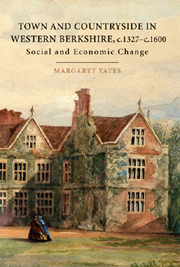Book contents
- Frontmatter
- Contents
- List of tables, figures, and maps
- Acknowledgements
- Abbreviations
- Sums of money
- 1 The end of the Middle Ages?
- 2 Landscapes, population and wealth in western Berkshire from the fourteenth to the sixteenth century
- 3 Town and country relations: Newbury and its hinterland
- 4 Estate management and profitability
- 5 Tenant society
- 6 Conclusion: the chronology of change
- Appendices
- Bibliography
- Index
4 - Estate management and profitability
Published online by Cambridge University Press: 05 February 2013
- Frontmatter
- Contents
- List of tables, figures, and maps
- Acknowledgements
- Abbreviations
- Sums of money
- 1 The end of the Middle Ages?
- 2 Landscapes, population and wealth in western Berkshire from the fourteenth to the sixteenth century
- 3 Town and country relations: Newbury and its hinterland
- 4 Estate management and profitability
- 5 Tenant society
- 6 Conclusion: the chronology of change
- Appendices
- Bibliography
- Index
Summary
Introduction
It is stating the obvious that landlords did not form a homogenous social group and the problem to be addressed in this chapter is the extent to which the different administrative regimes of the various lords affected the pace of change in the locality and the profitability of their estates.
Land formed the basis of any agrarian economy and therefore who owned the land and how it was administered would have had wide-ranging social consequences. The style of administration adopted would be influenced by various factors including the size of the estate, region in which it was situated, the underlying economic conditions of the time, and the personal inclinations of the individual lord. In addition to these factors income from an estate would be affected by the relationships between lord and tenant. Furthermore, the fifteenth century has been characterised as a difficult time for landlords, especially in maintaining the income from their properties, although the reasons for this observation are disputed. Indeed, these difficulties may have a longer history, dating from at least the early fourteenth century. Therefore the interaction between the different factors should be considered when exploring the reasons for change in a locality. Previous studies have correctly stressed the large variations in the practices of different lords, but have not examined with the same degree of emphasis the effects that this diversity had on the tenant population, a theme that will be addressed in this and the next chapter.
- Type
- Chapter
- Information
- Town and Countryside in Western Berkshire, c.1327–c.1600Social and Economic Change, pp. 125 - 174Publisher: Boydell & BrewerPrint publication year: 2007



